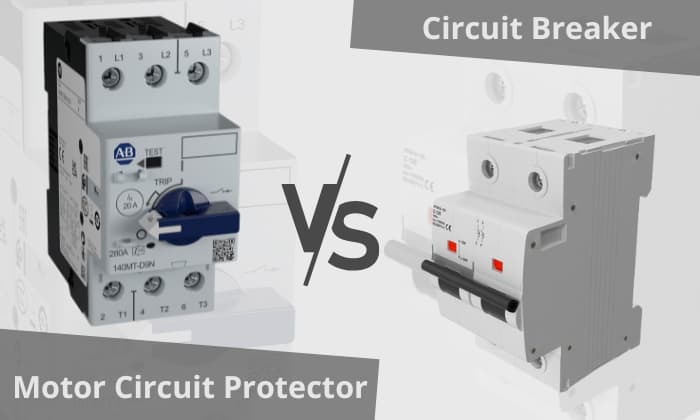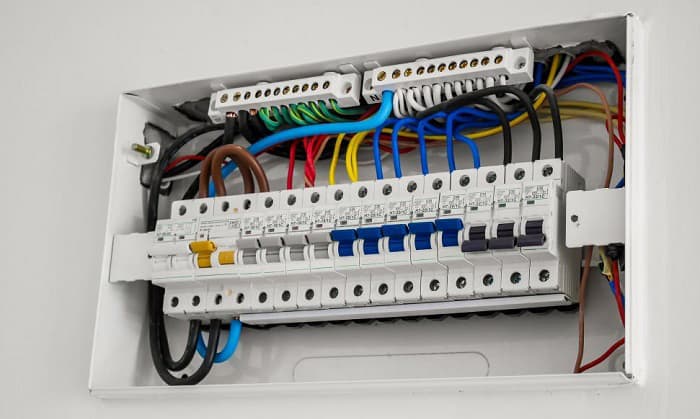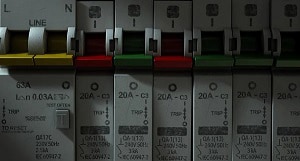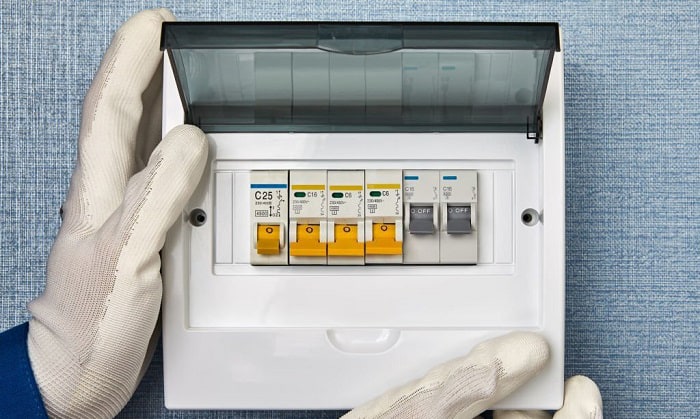You’re setting up your property’s circuitry, and now you’re thinking about choosing between motor circuit protector vs circuit breaker. But what’s the difference between them?
A motor circuit protector (MCP) is a circuit breaker generally used to control and protect connected motors. In comparison, a regular circuit breaker has similar traits, although you may use it for other electronics.
Continue reading as you take a deeper dive into MCPs and circuit breakers. By the end of this post, you can gain a better understanding of these two terms.
Table of Contents
MCP Vs Circuit Breaker Comparison
What Is a Circuit Breaker
The definition of a circuit breaker is a module that protects circuitry automatically. It comes equipped with a preventive feature, protecting connected devices from the harms of overloads, short circuits, and other electronic hazards.
What Is a Motor Circuit Protector?
MCP stand for motor circuit protector, which is also called an instantaneous trip (IT) circuit breaker. It is a protection unit made to prevent harm from overloads and short circuits.
MCPs may carry fuse protection features, although some models may not have this function. IT/MCP breakers often make up one part of a motor starter.
Related guide: Step by step to fix short circuits.
How Does It Work?
A motor circuit breaker protection unit functions by protecting a connected motor from short circuits. It typically has built-in magnetic protection guards that work by disconnecting the current as an electrical fault occurs.
However, it needs extra components to ensure safety against overloads.
On the other hand, the standard circuit breaker generally doesn’t have the same restrictions as an MCP breaker. In other words, the standard breaker is more versatile than its MCP counterpart since you can use it for many purposes, such as security from ground faults and arc faults.
Pros And Cons
Both a regular circuit breaker and a circuit breaker for motor protection can prevent potential harm to connected electronic devices. But both types of models often have distinct advantages and shortcomings.
For instance, a standard circuit breaker may have high service costs using professional labor, particularly when compared to fuses. On the other hand, this type is often more reliable in protecting electronics against electrical anomalies, since MCPs often don’t have overload protection.
However, an MCP circuit breaker can also deliver multiple benefits, such as providing great control over the circuitry, particularly in a motor-driven environment. It is also reusable, just like a regular breaker.
Both types will work in single-phase and three-phase circuits, so you’ll find a single phase motor protection circuit breaker or regular breaker without trouble. The same applies to three-phase models.
Differences
MCP electrical devices are only one breaker type, so you can imagine how the latter has a wider variety of designs, such as:
- Miniature circuit breaker (MCB)
- Molded case circuit breaker (MCCB)
- AFCI circuit breakers
- CAFCI circuit breakers
- Earth-leakage circuit breakers (ELCB)
- Automotive CBs
- Vacuum circuit breakers (VCB)
Related: A Comparison between AFCI vs CAFCI
Frequently Asked Questions
When Would You Use A Motor Circuit Protector?
A motor circuit breaker protector is often ideal in the motor control center (MCC) bucket applications. MCPs often don’t have protection against overloads, but in an MCC bucket, there are other safeguards against such problems.
What Is the Difference Between MPCB And MCB?
An MPCB often has an amperage rating of 0.1A to 630A. On the other hand, a miniature circuit breaker (MCB) typically has an amperage rating of 2A to 125A.
Where Can I Find a Motor Short-circuit Protector?
MCPs are available online and in electrical stores. You can buy them from many manufacturers, such as a motor circuit protector Schneider, Eaton, or Allen-Bradley makes.
What Is The Difference Between MPCB And MCCB?
Both the MPCB and molded case circuit breaker (MCCB) open and close circuits depending on the electrical load. But many MPCBs generally require human intervention to allow electricity to flow or stop.
MCCBs, on the other hand, may open and close circuits automatically. However, MCCBs have wider applications than MPCBs, as they’re not solely for motors.
How Do I Size A Circuit Breaker?
You can refer to a sizing chart to find the appropriate circuit breaker to fulfill your property’s electrical requirements. Otherwise, you need to calculate the load of the electronic device or motor and increase that amount by about 25% to get the breaker’s rating.
For example, if you have a 12A appliance, you need a circuit breaker with an approximate 15A rating. Don’t forget to check your property’s wiring diagram for certain details that may help you in finding the correct circuit breaker to use.
Conclusion
At this point, you now have a good understanding of the similarities and dissimilarities between a motor circuit protector vs circuit breaker. Make sure to choose the correct module for your circuit to prevent mishaps in your electrical environment.
Remember, an MCP typically has motor-protecting capabilities. But a standard circuit breaker may not have that feature. So choose wisely, and you should have peace of mind while using your electronic equipment.
Related comparison: GFCI Breaker Vs Regular Breaker.

I am Edwin Jones, in charge of designing content for Galvinpower. I aspire to use my experiences in marketing to create reliable and necessary information to help our readers. It has been fun to work with Andrew and apply his incredible knowledge to our content.




